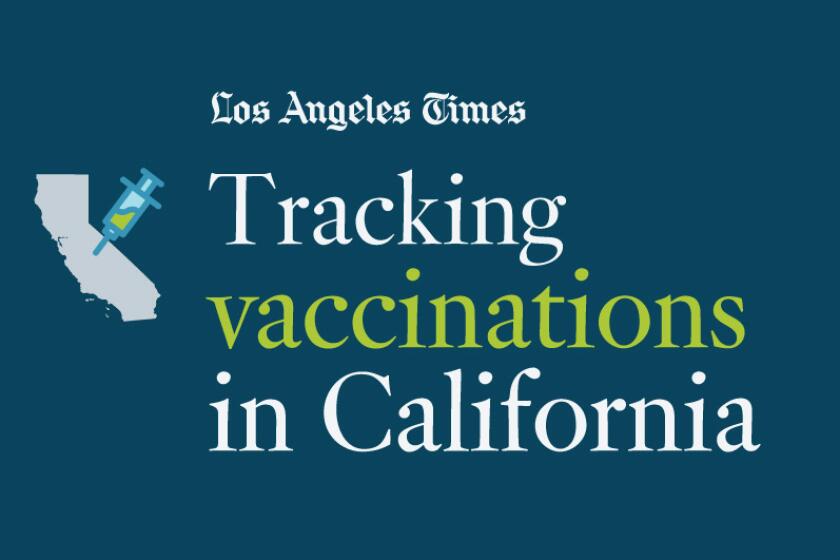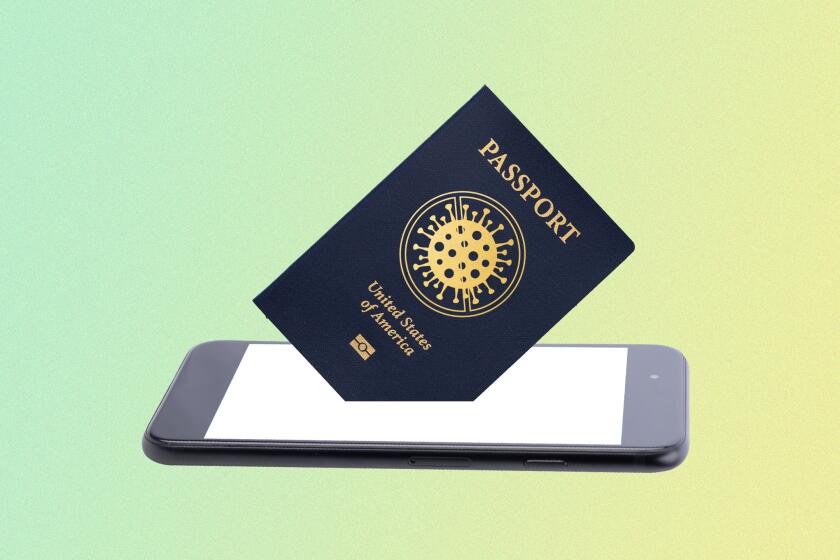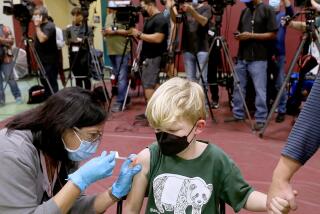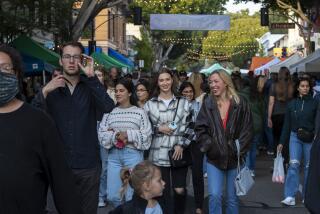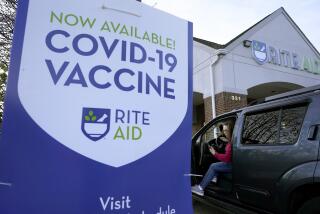Californians back proof of COVID vaccine or negative test at workplaces, other venues
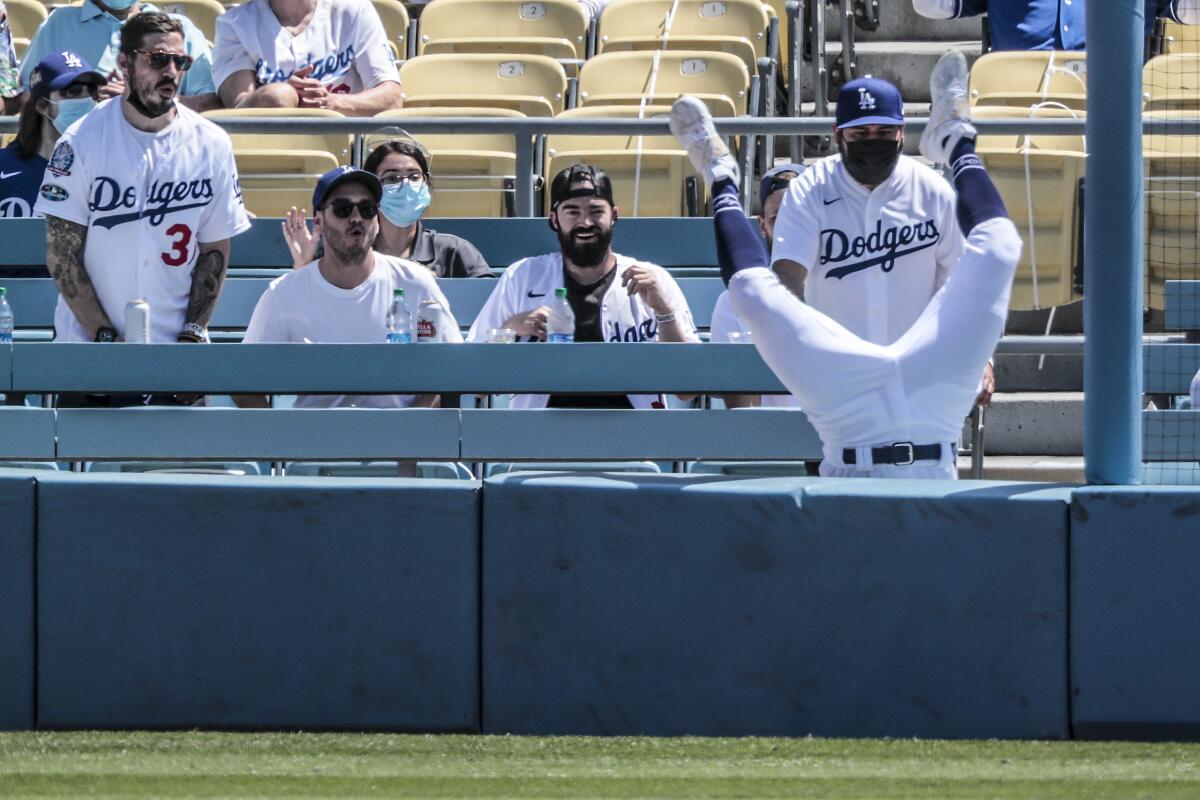
- Share via
As California’s businesses reopen, a majority of state residents are in support of allowing entertainment venues to require proof that their patrons are vaccinated or have tested negative for COVID-19, and for some employers to require vaccinations of workers, according to a statewide poll conducted by UC Berkeley’s Institute of Governmental Studies that was funded in part by The Times.
The survey of registered voters provides a snapshot of residents’ attitudes on COVID vaccination verification issues about a month after officials announced reopening rules for indoor live events that allowed some businesses to demand vaccine “passports.”
But poll data also highlights a big partisan split and uncertainty intertwined with every new phase of the pandemic recovery.
“The findings show that even at this later stage, politics powerfully shapes the way that Californians think about vaccination and the reopening of society,” said G. Cristina Mora, co-director of the Berkeley institute.
The poll found that 63% of residents support concert venues, sports stadiums, cruise ships and casinos requiring proof of vaccination or a negative COVID test for entry. Among those who identified as Democrats, 82% approved; among those with no party preference, 67% approved; and among those who said they belonged to other parties, 37% approved. A majority of Republicans, 66%, disapproved.
In the survey, 78% of those who indicated they were already vaccinated approved of the business requirements and 70% of those who said they were very likely to get vaccinated approved. Only 7% of those who said they were not at all likely to get vaccinated disapproved.
A majority of respondents also supported allowing some employers to require workers to be vaccinated for COVID-19. Democrats ranked highest with 79%; Republicans ranked lowest at 33%. An overwhelming majority of those who identified as strongly liberal or somewhat liberal approved of this idea. Only 30% of those who identified as strongly conservative approved.
California officials say they do not plan to require vaccine verification, but new rules incentivize private venues to seek proof of tests or inoculation.
According to guidance by the U.S. Equal Employment Opportunity Commission, employers could require COVID-19 vaccinations if the need to have one is job-related or if remaining unvaccinated would pose a direct threat to other employees, customers or themselves. Religious beliefs and an established disability or medical condition are the main exceptions. In those cases, the business and employee must work together to find an alternative.
When health officials last month announced the reopening rules for live outdoor events, state Public Health Officer Dr. Tomás Aragón said it would “incentivize people to get the vaccine and to get it as soon as they can so they can return to some of their favorite activities.”
But these so-called passports have garnered an unexpected backlash from some of the same critics who protested against mask mandates.
In Orange County, hundreds recently attended a Board of Supervisors meeting to oppose a pilot “passport program.” Despite assurances from officials, some opponents insisted the passports could be used to track people and reveal private healthcare information, and enable the county to favor residents who chose to get vaccinated.
Dr. Aaron Kheriaty, director of the medical ethics program at UC Irvine and a member of Orange County’s vaccine task force, has said he understands concerns over such proposals and tying vaccinations to some activities.
“If private entities start developing policies that deploy that tool as a gatekeeper, then I think the fears and concerns that many people are trying to express ... will be borne out,” he said. “I would consider blocking off access to otherwise ordinarily available public activities as a fairly heavy-handed form of coercion. I’m ‘pro’ let the person decide. Let the individual weigh their own risks and benefits.”
As of Monday, 59% of adults in the United States have received at least one dose of one of the available COVID vaccines, according to the U.S. Centers for Disease Control and Prevention. More than half of Californians have received at least one dose, according to a Times analysis.
Experts say about most Americans will need to be vaccinated to bring the coronavirus pandemic under control. Track California’s progress toward that goal.
Even with the majority of poll respondents supporting vaccine requirements, they did not have a consensus on what role government should play in verifying vaccine verification.
Overall, 35% of residents said the government “should be responsible for establishing a uniform verification system,” according to poll data. An additional 32% said government should play only a limited role by ensuring that applications meet minimum standards for security, privacy and accessibility. About 25% said government should not be involved at all and 7% had no opinion.
A majority of Democrats indicated government should be responsible, while a majority of Republicans said government shouldn’t be involved.
“Nobody has a sense of how government would even do that,” Mora said. For some, government’s involvement would signify too much “oversight and overreach,” she said.
We explain what vaccine passports are, how they work, where they’ve been implemented, and why some people object to them.
Even among residents with similar ideologies, opinions were mixed. A majority of voters who identified as strongly liberal said government should be involved but a majority of somewhat liberal voters said it should be a limited role. The majority of strongly conservative and somewhat conservative voters said government shouldn’t be involved at all.
“Some of it is just the unknown,” Mora said. “You can take it to a real extreme in which ... you have police people in all businesses and in every church. We’ve been living with the pandemic for a year now. Most people feel business have done what they’re going to do.”
About 10,200 of California’s registered voters were surveyed online in English and Spanish between April 29 and May 5. The margin of sampling error for the full survey is 2 points.
More to Read
Sign up for Essential California
The most important California stories and recommendations in your inbox every morning.
You may occasionally receive promotional content from the Los Angeles Times.

